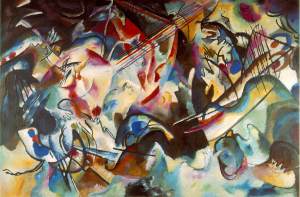 I have not entirely thought this through yet, but as I was driving back from the college today it occurred to me that the issue that loosely binds the Speculative Realists together is not that of overturning variants of Kantianism, correlationism, or philosophies of access. All of these critiques of the many variants of the philosophies of access are indeed central issues that need to be addressed, but in one way or another I think these projects can all be read as effects, symptoms, of a far more fundamental metaphysical principle. Or better yet, the critique of the philosophies of access is a negative formulation of a more basic and fundamental positive affirmation. This thought, though it will no doubt sound disappointing, almost banal, once I formulate it as a principle, was one of those moments where you feel as if you’ve been struck by lightning, blinded, or hit in the gut with a sudden philosophical idea where everything feels as if it’s being drawn together. Or perhaps again, it was the flash of a fundamental commitment, a drawing of the line, that you were trying to articulate all along.
I have not entirely thought this through yet, but as I was driving back from the college today it occurred to me that the issue that loosely binds the Speculative Realists together is not that of overturning variants of Kantianism, correlationism, or philosophies of access. All of these critiques of the many variants of the philosophies of access are indeed central issues that need to be addressed, but in one way or another I think these projects can all be read as effects, symptoms, of a far more fundamental metaphysical principle. Or better yet, the critique of the philosophies of access is a negative formulation of a more basic and fundamental positive affirmation. This thought, though it will no doubt sound disappointing, almost banal, once I formulate it as a principle, was one of those moments where you feel as if you’ve been struck by lightning, blinded, or hit in the gut with a sudden philosophical idea where everything feels as if it’s being drawn together. Or perhaps again, it was the flash of a fundamental commitment, a drawing of the line, that you were trying to articulate all along.
Whitehead had his ontological principle:
That every condition to which the process of becoming conforms in any particular instance has its reason either in the character of some actual entity in the actual world of that concrescence, or in the character of the subject which is in process of concrescence. This category of explanation is termed the ‘ontological principle.’… This contological principle means that actual entities are the onlyreasons; so that the search for a reason is to search for one or more actual entities. (PR, 24)
Leibniz had his Principle of Sufficient Reason:
…[T]here can be no fact real or existing, no statement true, unless there be a sufficient reason, why it should be so and not otherwise,
although these reasons usually cannot be known by us. (Monadology, §32)
Lucretius had his metaphysical principle:
This terror, then, this darkness of the mind,
Not sunrise with its flaring spokes of light,
Nor glittering arrows of morning can disperse,
But only Nature’s aspect and her law,
Which, teaching us, hath this exordium:
Nothing from nothing ever yet was born.
Fear holds dominion over mortality
Only because, seeing in land and sky
So much the cause whereof no wise they know,
Men think Divinities are working there.
What then would be the affirmation, the declaration, at the heart of object-oriented philosophy? What the Speculative Realists, and realists and materialist in general, seem to be declaring, regardless of the diversity of their various positions, is an ontic principle about the nature of beings or entities. This principle can be stated in exceedingly simple terms that are nonetheless rife with profound consequences. Very simply it states:
The Ontic Principle: There is no difference that does not make a difference.
Alternatively it could be articulated as “Latour’s Principle”, as Latour is one of the few philosophers to have clearly stated this principle in fundamental terms. As stated by Latour the principle would run:
Latour’s Principle: There is no transportation without translation.
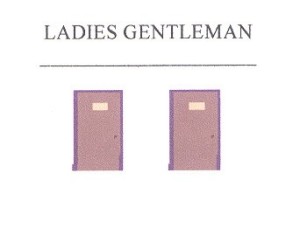 Given the current hegemonic forms of theory reigning today, the importance of the Ontic Principle can be more clearly articulated in terms of Latour’s formulation, for Latour’s formulation– especially as articulated in the magnificentReassembling the Social –most deeply hits at the heart of basic assumptions about language, culture, and society at the heart of questions asked by the most celebrated theoretical options of our day. When Latour refers to “transportation” he is referring to the relationship between two “actors” (Latour’s all purpose word for entities or objects, whether they’re living or physical, human or non-human, animal or mineral, etc.). Thus for example, in Lacanian terms, transportation might refer to the relation between a signifier and an entity such as the two doors as described in his famous example from “The Instance of the Letter”. For Lacan, the two doors are nothing more than bearers or vehicles of the signifiers /Ladies/ and /Gentlemen/, such that any talk of the entities involved, the doors themselves, the people that use these doors, etc., is irrelevant. In other words, in a manner similar to the relationship between concepts and intuitions in Kant, the being of the doors is exhausted in their function as bearers of these two diacritically defined signifiers. The doors themselves contribute nothing to being. Just as Saussure argued that the signifier is not to be located in the sound, the articulation, but rather the pure differential among phonemes that has only an ideal existence, the only function served by the doors in Lacan is as a material embodiment or actualization of this ideal, diacritical relation. To be sure, Lacan will argue that there is also the real and the imaginary. Yet in all cases these will be defined negatively as functions of the signifier. As Žižek endlessly repeats, the real is not something other than the symbolic, but is a particular twist within the symbolic itself.
Given the current hegemonic forms of theory reigning today, the importance of the Ontic Principle can be more clearly articulated in terms of Latour’s formulation, for Latour’s formulation– especially as articulated in the magnificentReassembling the Social –most deeply hits at the heart of basic assumptions about language, culture, and society at the heart of questions asked by the most celebrated theoretical options of our day. When Latour refers to “transportation” he is referring to the relationship between two “actors” (Latour’s all purpose word for entities or objects, whether they’re living or physical, human or non-human, animal or mineral, etc.). Thus for example, in Lacanian terms, transportation might refer to the relation between a signifier and an entity such as the two doors as described in his famous example from “The Instance of the Letter”. For Lacan, the two doors are nothing more than bearers or vehicles of the signifiers /Ladies/ and /Gentlemen/, such that any talk of the entities involved, the doors themselves, the people that use these doors, etc., is irrelevant. In other words, in a manner similar to the relationship between concepts and intuitions in Kant, the being of the doors is exhausted in their function as bearers of these two diacritically defined signifiers. The doors themselves contribute nothing to being. Just as Saussure argued that the signifier is not to be located in the sound, the articulation, but rather the pure differential among phonemes that has only an ideal existence, the only function served by the doors in Lacan is as a material embodiment or actualization of this ideal, diacritical relation. To be sure, Lacan will argue that there is also the real and the imaginary. Yet in all cases these will be defined negatively as functions of the signifier. As Žižek endlessly repeats, the real is not something other than the symbolic, but is a particular twist within the symbolic itself.
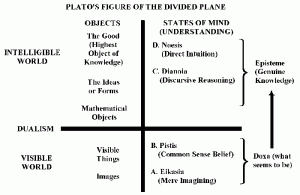 A similar moment occurs in Plato’s famous analogy of the divided line as developed in Book VI of the Republic. When Plato articulates the first stage of belief moving beyond doxa into the domain of genuine episteme, the first level of true knowledge is to be found in dianoia and, in particular, mathematical reasoning. The ontological correlate of dianoia or discursive reasoning is to be found in the domain of mathematical objects. However, if Plato places discursive reasoning and mathematical objects beneath noesis or direct intuition of theforms, then this is because in Plato discursive reasoning still relies on diagrams (icons as Peirce would put it), mathematical writing, inscription, etc. Just as Lacan will later renounce the imaginary dimension of mathematics by virtue of its reliance on images, Plato too sees the mathematical as a partially corrupted version of the “real” objects: The Forms. Thus, while each lower level on the divided line does, indeed, contribute some difference, this difference is always articulated in negative terms as a departure from true reality or as something that depends on something else, something mediated through something else, in its being.
A similar moment occurs in Plato’s famous analogy of the divided line as developed in Book VI of the Republic. When Plato articulates the first stage of belief moving beyond doxa into the domain of genuine episteme, the first level of true knowledge is to be found in dianoia and, in particular, mathematical reasoning. The ontological correlate of dianoia or discursive reasoning is to be found in the domain of mathematical objects. However, if Plato places discursive reasoning and mathematical objects beneath noesis or direct intuition of theforms, then this is because in Plato discursive reasoning still relies on diagrams (icons as Peirce would put it), mathematical writing, inscription, etc. Just as Lacan will later renounce the imaginary dimension of mathematics by virtue of its reliance on images, Plato too sees the mathematical as a partially corrupted version of the “real” objects: The Forms. Thus, while each lower level on the divided line does, indeed, contribute some difference, this difference is always articulated in negative terms as a departure from true reality or as something that depends on something else, something mediated through something else, in its being. 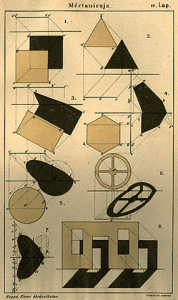 If eikasia or imagining is the lowest level of knowledge, then this is because it is mediated in a variety of ways, requiring a medium within which the image can be produced (e.g., a pond), a catalyst of reflection (e.g., sunlight), an object to be reflected (e.g., that tree over there), and the form in which the object participates (e.g., the form of a tree). Each mediation is also a degradation, departing further from the Form or true reality which is treated as the only form that matters. Not only, as Deleuze remarks in the sublime eleventh chapter ofExpressionism and Philosophy, is the entity (the reflection) reduced to a mere bearer or transport of the Form (what Deleuze there refers to as the “participated”), but this participation is actually treated as a violence or degradation of the form or theonly difference that truly matters.
If eikasia or imagining is the lowest level of knowledge, then this is because it is mediated in a variety of ways, requiring a medium within which the image can be produced (e.g., a pond), a catalyst of reflection (e.g., sunlight), an object to be reflected (e.g., that tree over there), and the form in which the object participates (e.g., the form of a tree). Each mediation is also a degradation, departing further from the Form or true reality which is treated as the only form that matters. Not only, as Deleuze remarks in the sublime eleventh chapter ofExpressionism and Philosophy, is the entity (the reflection) reduced to a mere bearer or transport of the Form (what Deleuze there refers to as the “participated”), but this participation is actually treated as a violence or degradation of the form or theonly difference that truly matters.
When Latour declares that “there is no transportation without translation” his point is that there is no relation between entities that does not involve some labor of translation. To illustrate this declaration– and such principles can only really be declarations or fundamental commitments –we would do well to begin by taking the term “translation” rather literally. Suppose we are discussing Toscano’s translation of Badiou’s Logiques des mondes (pssst, Alberto, when’s it finally coming out?). Logiques des mondes cannot simply be transported into English, but rather English must be made to speak French and French must be made to speak English. The transportation of a text from one language to another language is not a transport that occurs without remainder, without any transformation, but requires an entire labor that produces something new in the process that is a simulacrum of the original (in Deleuze’s sense, not Baudrillard’s sense), but also different as well. The medium of English contributes something that wasn’t there before, just as the French also functions as a catalyst for all sorts of unforeseen adventures in English. To say that there is no transportation without translation is to say that there is no entity, no being, that does not contribute a difference in the process of being transported into something else or in interacting with something else.
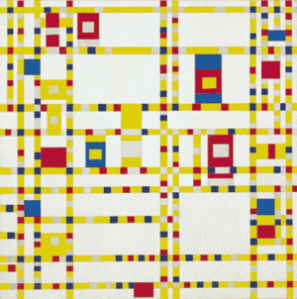 Henceforth, should one adopt the Ontic or Latour’s Principle, it follows that no entity can any longer be treated as a mere beareror vehicle of another entity. If an entity is treated as a mere vehicle of another entity, whether that entity transporting itself be the symbolic, categories, essences, forms, language, the “transcendental”, the “police”, the social, power, etc., then we should immediately consign the position to flames; recognizing simultaneously that the position in question is both itself an entity and therefore an actor and that it is fundamentally mistaken ontologically. As a result of this position we are able to articulate the most fundamental anti-humanism yet imagined, for immediately humans are disbarred from having a central or hegemonic position in the order of beings insofar as they only contribute one difference among others. The difference contributed by the human, whether in the form of a transcendental subject, Dasein, society, or language is neither more nor less than the difference or translation contributed in the encounter of a tree and lightning. As a result, we get an ontology far more exotic than those so far imagined– should it be called an “onticology”? –for difference, that which makes the difference, can come from anything from the smallest particle of matter to a collective naming itself the Aztecs, to the individuals that make up that collective, the pots they use, the rivers in the region, volcanoes, etc., etc., etc.. All of this must be counted. If this principle must be called the Ontic Principle, then this is because it sings the hymns of all beings, rather than striving to reduce all beings to one being, seeing all the others as nothing but derivative corruptions. Granting this– and when has philosophy ever been anything more than a meditation on difference in one form or another? When has the question ever been anything other than “what are the differences”? –philosophy then becomes a meditation on those various ways in which difference makes a difference. For how could difference be difference if it did not first differ from itself?
Henceforth, should one adopt the Ontic or Latour’s Principle, it follows that no entity can any longer be treated as a mere beareror vehicle of another entity. If an entity is treated as a mere vehicle of another entity, whether that entity transporting itself be the symbolic, categories, essences, forms, language, the “transcendental”, the “police”, the social, power, etc., then we should immediately consign the position to flames; recognizing simultaneously that the position in question is both itself an entity and therefore an actor and that it is fundamentally mistaken ontologically. As a result of this position we are able to articulate the most fundamental anti-humanism yet imagined, for immediately humans are disbarred from having a central or hegemonic position in the order of beings insofar as they only contribute one difference among others. The difference contributed by the human, whether in the form of a transcendental subject, Dasein, society, or language is neither more nor less than the difference or translation contributed in the encounter of a tree and lightning. As a result, we get an ontology far more exotic than those so far imagined– should it be called an “onticology”? –for difference, that which makes the difference, can come from anything from the smallest particle of matter to a collective naming itself the Aztecs, to the individuals that make up that collective, the pots they use, the rivers in the region, volcanoes, etc., etc., etc.. All of this must be counted. If this principle must be called the Ontic Principle, then this is because it sings the hymns of all beings, rather than striving to reduce all beings to one being, seeing all the others as nothing but derivative corruptions. Granting this– and when has philosophy ever been anything more than a meditation on difference in one form or another? When has the question ever been anything other than “what are the differences”? –philosophy then becomes a meditation on those various ways in which difference makes a difference. For how could difference be difference if it did not first differ from itself?
I am deeply indebted to Graham Harman’s marvelous and forthcoming Prince of Networks in thinking this.
see Larvalsubjects
- See the journal French Metablog with today different posts - Jean-Philippe Pastor

No comments:
Post a Comment